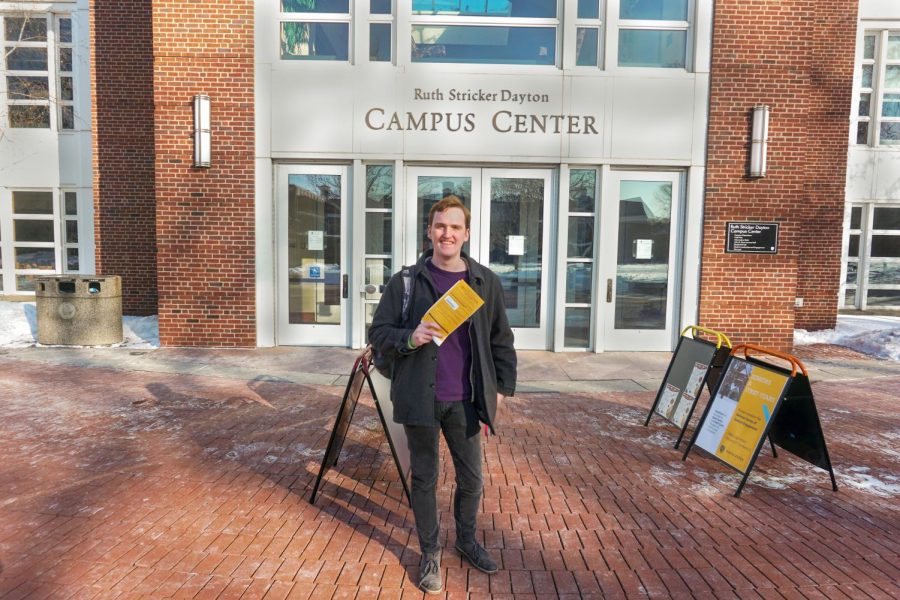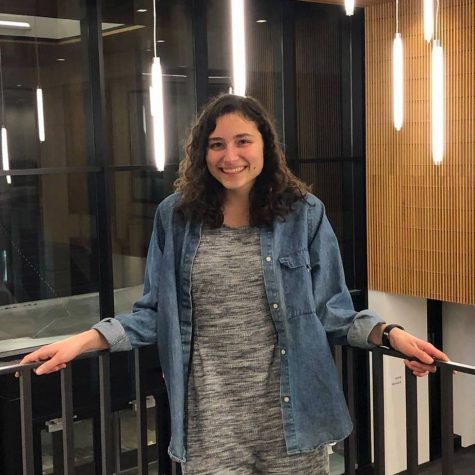As 2020 ramps up, Mac students weigh: vote at home or school?
February 20, 2020
With the first primaries of the 2020 presidential election under way, students at Macalester from elsewhere in the U.S. have a choice to make — whether to vote here in St. Paul or to fill out absentee ballots to vote in their hometowns. Both legally and personally, the question is complicated.
Voting laws leave that choice mostly up to students.
“The law says that you’re supposed to vote from the place that is your home,” Derek Johnson, civic leadership and outreach coordinator at the Civic Engagement Center, said. “It’s a hard conversation to sort of think about — what feels like home to you?”
Andrew Padgett ’20 votes in his hometown of Rhinelander, Wisconsin for that reason.
“I think I feel more connected to my politics back home… the mayor of the town I grew up in was my hockey coach for five years, and I feel like I have a more direct connection to the politicians there,” Padgett said.
Jesse Crosby ’20 from Alfred, New York decided to start voting in Minnesota when he moved here to attend Macalester in 2016.
“I think where my politics [are] more invested now is out here,” Crosby said. “I’m still invested in it back at home, I still want to see those elections go in the right direction, for my point of view, but I think that out here is where I feel more connected.”
But where someone considers “home” is not the only factor in determining where they vote.
Some students discussed the skewed results that the electoral system yields — in 2016, Donald Trump won the general election while losing the popular vote.
In the Iowa caucuses, Bernie Sanders won the popular vote, but Pete Buttigieg walked away with more pledged delegates. Certain states or districts end up carrying more weight than others, and students are often strategic about where they vote.
Mac Dems Vice Chair Alex Jacobson ’22, who came to Macalester from New York City, decided to vote in St. Paul since its elections are usually closer.
“Our electoral system is strange anyway — really, we should have a popular vote system where voting in New York really would count just as much for the presidency, say, but we don’t,” Jacobson said.
Mac Dems Co-Chair Jimmy Cooke ’20, originally from Washington state, changed his vote to Minnesota once he arrived at Macalester — thinking that his Democratic votes would carry more influence here.
“If your home state is much safer for liberals than Minnesota, I do think there would be a solid case to be made about the merits of changing your registration,” Cooke said.
For Padgett, the closeness of statewide and national races in Wisconsin was the main reason for him keeping his vote there.
“Wisconsin is the swingiest swing state that there is,” Padgett said. “And so voting for president, you have a lot more impact when you vote in a swing state than you do in a non-swing state”
The chaos of this year’s Iowa caucuses raised questions about both the efficiency and democracy of caucuses. Even so, participating in an Iowa caucus gives students a chance to voice their preference in the earliest and one of most influential primary states.
“Given the disaster that was the Iowa caucus, I hope this puts the nail in the coffin for the caucuses and [for] Iowa going first, but I’m going to take advantage of that opportunity while I still can,” Catherine Collins, who participated in the St. Paul satellite caucuses, said.
Collins is a member of Mac Civic Action, a group on campus that focuses on civic engagement, political awareness and voter turnout.
“A lot of people do have really good compelling reasons that they want to vote back [at home], but we encourage people to vote whenever and wherever they can,” Collins said.
Voting whenever possible includes voting in local elections both at home and here — Collins voted in St. Paul’s elections last fall. While voting twice in the same election is illegal, registering to vote in multiple states is not.
Logistics of voting are a point to consider, too — Minnesota allows same-day registration, so anyone who forgets to pre-register or request an absentee ballot from their home state can register and vote here on election day.
Mac Dems is also considering a new initiative to help students fill out absentee votes.
“We do have members who vote absentee,” Jacobson said. “We’re thinking about potentially doing something to help people get their absentee ballots in this election cycle.”
If the proposed initiative receives positive response from students, Mac Dems hopes to have it ready for the November elections.
Both for St. Paul voters and absentee voters, the turnout rate has a lot of room to grow this year. In 2016, 57.9 percent of Macalester students who could vote actually cast a ballot. In the 2018 midterm elections, the turnout was 53.5 percent. Getting voter turnout up was important for several student activists.
“Vote where you’re most excited or interested about voting,” Cooke said. “Because that’s what we need the most out of this, just people who are excited about the act of voting”
“I’m all for voting and doing your civic duty, so any opportunity I’m given, I like to take,” Collins said.














